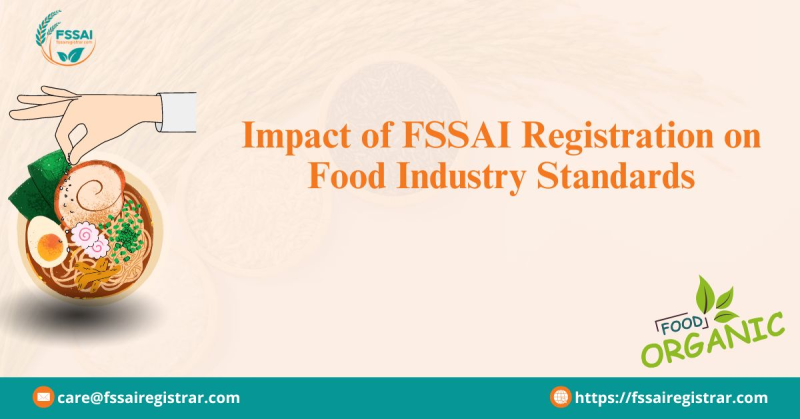Introduction
The Food Safety and Standards Authority of India (FSSAI) plays a pivotal role in regulating and supervising food safety across India. Established under the Food Safety and Standards Act, of 2006, the FSSAI aims to ensure that food products undergo rigorous quality checks, thereby reducing the chances of adulteration, contamination, and substandard products. One of the critical functions of the FSSAI is the registration and licensing of food businesses, which has a profound impact on the standards of the food industry.
Ensuring Food Safety
FSSAI registration is a fundamental requirement for all food business operators (FBOs) in India. This registration ensures that the food being manufactured, stored, distributed, or sold adheres to prescribed safety standards. By enforcing these standards, FSSAI plays a crucial role in mitigating foodborne illnesses and ensuring public health safety.
Compliance with Hygiene and Sanitation Standards
FSSAI registration mandates strict compliance with hygiene and sanitation standards. FBOs are required to maintain cleanliness in their premises, ensure proper waste disposal, and follow hygiene practices in food handling. Regular inspections and audits by FSSAI officials ensure that these standards are consistently met, thereby elevating the overall hygiene levels within the food industry.
Monitoring and Control of Food Adulteration
Adulteration is a significant concern in the food industry, posing severe health risks to consumers. FSSAI registration requires FBOs to maintain transparency in their operations and keep records of their ingredients and processes. This traceability helps in identifying and controlling instances of food adulteration. The strict penalties and legal actions against violators further deter the practice of adulteration, promoting the sale of pure and unadulterated food products.
Standardization of Food Quality
FSSAI registration promotes the standardization of food quality across the industry. By defining clear guidelines and specifications for various food products, the FSSAI ensures that consumers receive products that meet consistent quality benchmarks.
Product Labeling and Information Disclosure
One of the key aspects of FSSAI registration is the requirement for proper labeling and information disclosure on food products. Labels must include details such as the list of ingredients, nutritional information, manufacturing and expiry dates, and FSSAI license or registration number. This transparency empowers consumers to make informed choices about the food they consume, fostering trust and confidence in food brands.
Encouraging Innovation and Improvement
FSSAI's stringent standards and continuous monitoring encourage food businesses to innovate and improve their products and processes. To comply with the high standards set by FSSAI, FBOs invest in better technologies, adopt best practices, and continually strive to enhance the quality and safety of their offerings. This culture of continuous improvement drives the overall progress of the food industry.
Boosting Consumer Confidence
FSSAI registration significantly boosts consumer confidence in the food industry. When consumers see the FSSAI logo or registration number on a product, they perceive it as a mark of quality and safety. This perception not only enhances the credibility of the brand but also encourages more consumers to choose FSSAI-registered products over unregistered ones.
Building Brand Reputation
For food businesses, FSSAI registration is more than just a legal requirement; it is a tool for building a strong brand reputation. Businesses that comply with FSSAI standards are seen as responsible and trustworthy. This positive image attracts more customers and helps in establishing a loyal customer base. In a competitive market, this reputation can be a significant differentiator, driving business growth and success.
Facilitating Market Access
FSSAI registration also facilitates market access, both domestically and internationally. In India, many retailers and distributors prefer to deal with FSSAI-registered suppliers to ensure compliance with food safety regulations. For export-oriented businesses, FSSAI registration is often a prerequisite for entering foreign markets, as it aligns with global food safety standards. Thus, FSSAI registration opens up new avenues for growth and expansion for food businesses.
Enhancing Regulatory Compliance
FSSAI registration streamlines regulatory compliance for food businesses. By providing clear guidelines and support, FSSAI helps businesses understand and meet the necessary legal requirements. This structured approach reduces the burden of compliance and minimizes the risk of legal issues, enabling businesses to operate smoothly.
Training and Capacity Building
FSSAI conducts various training programs and workshops to educate FBOs about food safety standards, best practices, and regulatory requirements. These initiatives help businesses build their capacity to comply with FSSAI regulations effectively. By investing in training and capacity building, FSSAI ensures that food businesses are well-equipped to maintain high standards of food safety and quality.
Encouraging Self-Regulation
Through its registration and licensing processes, FSSAI encourages food businesses to adopt self-regulation practices. By fostering a culture of accountability and responsibility, FSSAI promotes self-regulation, where businesses proactively maintain compliance without constant oversight. This approach not only eases the regulatory burden on the authorities but also instills a sense of ownership among businesses, driving them to uphold high standards consistently.
Note: Re-new your FSSAI certificate by clicking - FSSAI LICENSE RENEWAL
Conclusion
FSSAI registration has a profound impact on food industry standards in India. By ensuring compliance with safety and quality regulations, promoting standardization, boosting consumer confidence, and facilitating market access, FSSAI registration plays a crucial role in elevating the overall standards of the food industry. As the regulatory framework continues to evolve, FSSAI remains committed to safeguarding public health and promoting a robust and trustworthy food industry. For food businesses, obtaining and maintaining FSSAI registration is not just a legal obligation but a vital step towards achieving excellence and sustainability in the competitive food market.
